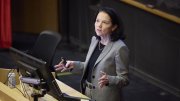During the past several weeks, as the COVID-19 pandemic swept across the globe and into Boston, poet and physician Rafael Campo has been writing poems to help make sense of the crisis. Below is a draft of one still in process, but which he agreed to share.
THE DOCTOR’S SONG
The ventilator’s rise and fall.
The ambulance’s siren call.
The yellow gown’s swish down the hall.
They page us and we go. The wail
of loved ones. Silence then, until
the next alarm, a pulsatile
bleat almost like an infant’s cry.
A team in baggy scrubs runs by.
The coughing like a symphony
a virus might conduct. We listen,
as if the breath sounds might not lessen.
As if the body we are given
protected us. The stethoscope
won’t be an instrument of hope:
It merely amplifies the gallop,
makes audible the broken heart.
The doctor’s song is not heroic.
Sing like the needle. Sing like hurt.
—Rafael Campo









